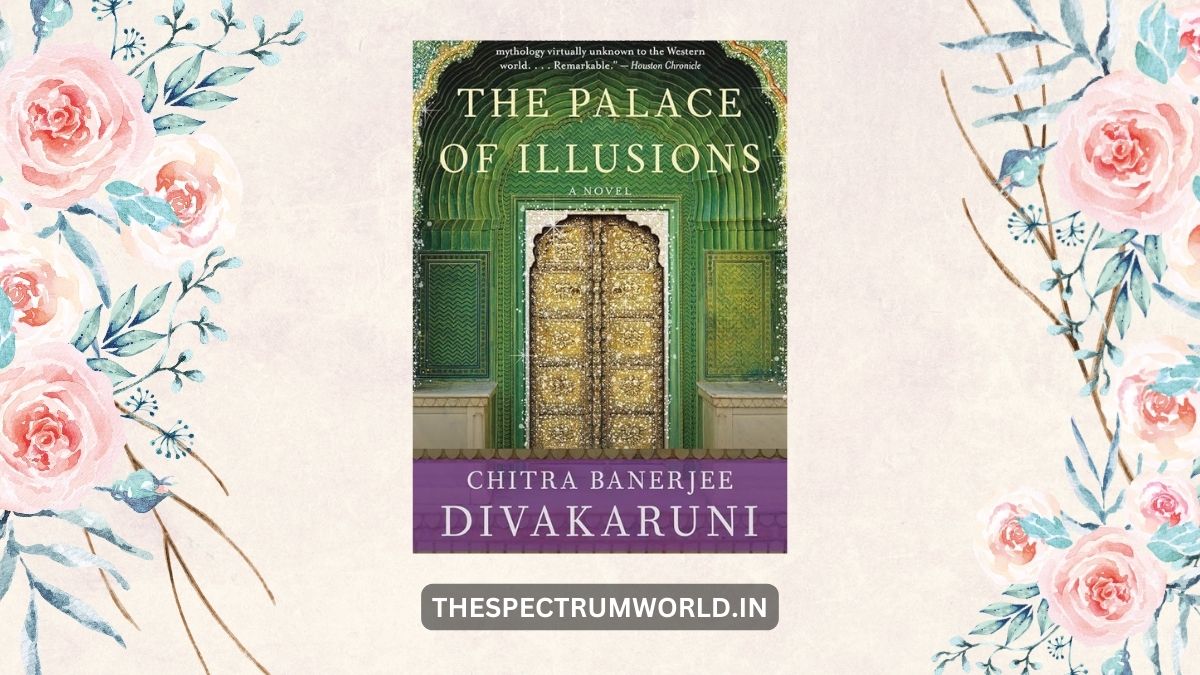The Palace of Illusions: A Review
Chitra Banerjee Divakaruni’s “The Palace of Illusions” is a mesmerizing retelling of the ancient Indian epic, the Mahabharata, from the perspective of Panchaali, the wife of the Pandavas. This beautifully crafted novel explores themes of love, duty, and self-discovery, delving deep into the complexities of human relationships and the struggles of a woman in a patriarchal society.
Table of Contents

A Review of The Palace of Illusions:
Through Panchaali’s narrative voice, Divakaruni masterfully weaves together mythology, history, and fiction, creating a rich tapestry of characters and events. The novel’s pacing is impeccable, balancing action, romance, and introspection, keeping the reader engaged and invested in Panchaali’s journey.
The characters in the novel are multidimensional and complex, with Panchaali’s inner struggles and growth taking center stage. Her relationships with her husbands, particularly Bhima and Arjuna, are poignant and nuanced, showcasing the intricacies of polygamous relationships and the struggles of a woman torn between her duty and her desires.
Divakaruni’s exploration of female agency, desire, and empowerment is refreshing and thought-provoking, offering a unique perspective on a classic tale. The writing is evocative and lyrical, with vivid descriptions of ancient India’s landscapes, cultures, and customs, transporting the reader to a bygone era.
The dialogue is authentic and engaging, bringing the characters to life, and the author’s use of language is masterful, creating a sense of timelessness and universality. The themes of love, family, and loyalty are timeless and relatable, making the novel a must-read for anyone who loves mythology, historical fiction, or simply great storytelling.

One of the strengths of The Palace of Illusions is its ability to humanize mythological characters, making them relatable and accessible to modern readers. Panchaali’s struggles with her own desires and agency are deeply relatable, and her journey toward self-discovery and empowerment is inspiring.
The novel also explores themes of duty, loyalty, and honor, highlighting the complexities of these values in the context of war and family dynamics. The characters’ struggles with their own moral codes and the consequences of their actions are thought-provoking and nuanced.
In addition to its compelling characters and storyline, the novel also offers a unique perspective on Indian history and culture. Divakaruni’s vivid descriptions of ancient India’s landscapes, cultures, and customs are meticulously researched and authentic, offering a fascinating glimpse into a bygone era.
The Palace of Illusions’ exploration of gender roles and sexuality is also noteworthy, offering a fresh perspective on these themes in the context of ancient India. Panchaali’s struggles with her own sexuality and desires are deeply relatable, and her journey towards self-acceptance and empowerment is inspiring.
Furthermore, the novel’s use of language and imagery is masterful, creating a rich and immersive reading experience. The author’s use of metaphor, simile, and other literary devices adds depth and complexity to the narrative, making it a joy to read.

Interesting Quotes from The Palace of Illusions:
- “The world is a palace of illusions, and we are all caught in its web.”
- “The truth is, we are all prisoners of our own making. We create our own illusions, and then we get trapped in them.”
- “The mind is a powerful tool, Pancha. It can create and destroy. It can make us see what is not there, and miss what is right in front of us.”
- “Sometimes, the hardest battles are the ones we fight with ourselves.”
- “Life is a journey, not a destination. And the journey is filled with twists and turns, ups and downs.”
- “We must learn to let go, Pancha. Let go of our fears, our doubts, our insecurities. Let go of our need to control.”
- “The only way to truly find ourselves is to lose ourselves in the service of others.”
In conclusion, “The Palace of Illusions” is a triumph of storytelling, offering a fresh perspective on a beloved classic. Divakaruni’s masterpiece will captivate readers with its universal themes, memorable characters, and the enduring power of love and resilience. With its beautiful prose, compelling characters, and thought-provoking themes, this novel is a must-read for anyone who loves mythology, historical fiction, or simply great storytelling.
The novel’s impact on the reader is profound, leaving a lasting impression long after the final page is turned. It is a testament to the power of storytelling, highlighting the importance of empathy, compassion, and understanding in our lives.

In addition, the novel’s exploration of Indian history and culture offers a unique perspective on a fascinating era, making it a valuable resource for scholars and history enthusiasts alike.
Overall, “The Palace of Illusions” is a masterpiece of storytelling, offering a fresh perspective on a beloved classic. It is a must-read for anyone who loves mythology, historical fiction, or simply great storytelling.
Read more: Some Really Amazing Points to Know About Adipurush







One thought on “The Palace of Illusions: A Review”